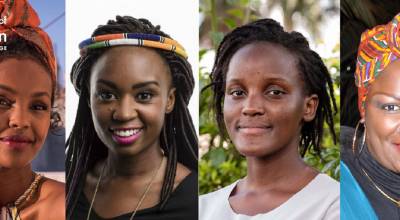
Knowledge Hub
The Chalbi desert was once part of an extensive lake in northern Kenya. The desert, around 100,000 square kilometres (slightly bigger than the island of Ireland), is aptly named ‘Chalbi’ - meaning ‘bare and salty’ in the language of the Gabbra people who live there.
When the rain comes, the desert fills with shallow water and is frequented by wildlife including ostriches, zebras and even spotted hyenas. But when the rain disappears, the endless stretch of desert provides a unique opportunity for the nomadic Gabbra tribe – it exposes desert salt.
This salt provides essential nutrients for livestock, said to help animals grow healthier and yield better produce. But not everyone has access to it - especially those living in the hills that border Ethiopia. This is where the Chalbi Salt Self-Help Group comes in.
A group of 15 women embark on a two-day trip to collect salt from the desert, which is 20km away. They then sell this to local farmers and herders, who either mix it with water or let their animals lick it in its pure form.

Investing in a better future
This salt provides a great source of income for these hard-working women, not only to buy food for their families but to also pool together to invest in a better future.
Not all women can get access to banks or credit, which is a substantial barrier to escaping extreme poverty. So this group are doing it on their own. Every Monday, the group meets and each member contributes 200 shillings (around £1.30). They then lend a little of their savings to a woman who needs it, i.e. to buy seeds to grow food to sell. The money is paid back with a little extra interest, which is added to their savings pot and can help the next woman in need - continuing the cycle of support.
But it doesn’t stop there. The group is also using their profits to provide educational support to disadvantaged girls.

So far, the group has supported ten girls in their community, aged 11-14, by providing uniforms, exercise books and pens. “We’re supporting girls’ education so they don’t fall behind,” says Doke, a member of the group. “If you educate a girl child and she pursues well in her studies she will get somewhere. She not only supports her family, but the entire community can benefit.”
An education is so important in helping girls to build a pathway out of poverty. One of the biggest barriers to this is early marriage. Children can be ‘booked’ for marriage as early as two years old, but Doke says the power in the Gabbra community is shifting. “An educated girl can decide who she wants to marry… if she says no, then it’s off. The girl is the final judge now,” she tells us defiantly.
Doke is also challenging symbolic inequalities. In the traditional Gabbra clothing, the beads each woman wears represent which Gabbra clan she belongs to, whether she’s married and if she has a son. However, Doke wants girls to be seen as being of equal importance to boys: “This is a cultural symbol of how we recognise a boy child, but the girl child is not recognised. So we are fighting for the right of the education of a girl child, so they will bring us all to an equal level.”

Supporting self-help groups
Desert salt is a natural resource – which makes it naturally unreliable. During the rainy season, the salt completely dissolves, leaving nothing. The group were once caught in the rain when returning home with 100 bags of salt. Without any shelter, their hard work was put to waste, as every last grain dissolved.
Through the long rainy season Doke and her group started to panic. Without an income, Doke feared they would have to close the business. This would not only have a huge impact on their families but the school girls they are supporting, too.
However, Concern was able to step in and provide the funding needed to keep Doke and her group afloat, as well as training on business skills and how to grow their own food, until they could get back on their feet again.

The group needed just 25,000 Kenyan shillings (around £164), which helped to cover the income the women had lost. “Without it [the grant] we could have closed down, because there is nothing,” Doke says. “We received a grant and training when the need was very high, we are very appreciative of that,” she says.
The group were able to feed their families during what would have been a very difficult rainy season. And, with the money left over, they were even able to invest in other non-weather-dependant businesses such as buying and selling clothes. Needless to say, these are some savvy women.
The Chalbi Salt Self-Help Group aren’t the only people lifting themselves out of poverty. Last year, Concern helped 74 communities in Kenya achieve self-sustenance, meaning they no longer need Concern’s support – an aim we have for every community we work with.
Having weathered the storm, the group are now back on their feet and making exciting plans for future investments, such as a vehicle to transport the salt quickly and safely. For now, though, their ambition and determination to empower local women and girls shines through every step of their 20km journey.





